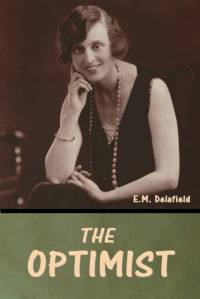Om The Optimist
When Owen Quentillian returns to visit Canon Morchard in the idyllic village where he spent his childhood before the First World War, he finds the Canon a self-declared optimist, clinging to the Victorian beliefs about religion, family life and moral values which the war has shattered. Is the Canon a domestic tyrant? Are his children struggling to break free? Or does this family have anything to teach Quentillian about life and how to live it? (Helen)
About the author:
Edmée Elizabeth Monica Dashwood, née de la Pasture (9 June 1890 - 2 December 1943), commonly known as E. M. Delafield, was a prolific English author. She is best known for her largely autobiographical Diary of a Provincial Lady, which took the form of a journal of the life of an upper-middle class Englishwoman living mostly in a Devon village of the 1930s. In sequels, the Provincial Lady buys a flat in London, travels to America and attempts to find war-work during the Phoney War. Delafield's other works include an account of a visit to the Soviet Union, but this is not part of the Provincial Lady series, despite being reprinted with the title The Provincial Lady in Russia.
Delafield was born in Steyning, Sussex. She was the elder daughter of Count Henry Philip Ducarel de la Pasture, of Llandogo Priory, Monmouthshire, and Elizabeth Lydia Rosabelle, daughter of Edward William Bonham, who as Mrs Henry de la Pasture was also a well-known novelist. The pen name Delafield was a thin disguise suggested by her sister Yoe. After Count Henry died, her mother married Sir Hugh Clifford GCMG, who governed the colonies of the Gold Coast (1912-19), Nigeria (1919-25), Ceylon (1925-27) and the Malay States.
Delafield was a respected and highly prolific author in her day, but only the Provincial Lady series achieved wide commercial success. Her first novel Zella Sees Herself quickly went into a second impression and a first royalty cheque of £50.
Rachel Ferguson complained that she wrote too much and her work was uneven whilst considering The Way Things Are a "completely perfect novel" and suggesting (in 1939) that "her humour and super-sensitive observation should make of her one of the best and most significant writers we possess, a comforting and timeless writer whose comments will delight a hundred years hence." (wikipedia.org)
Visa mer

